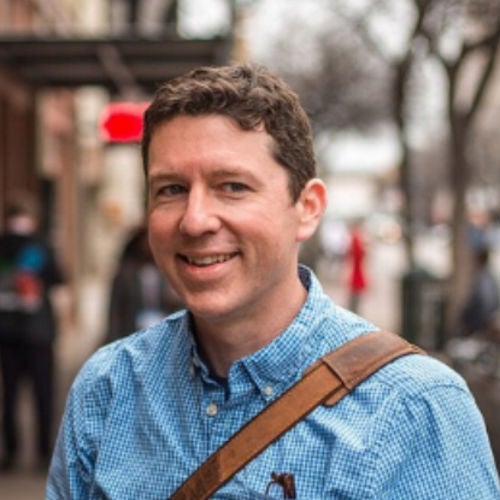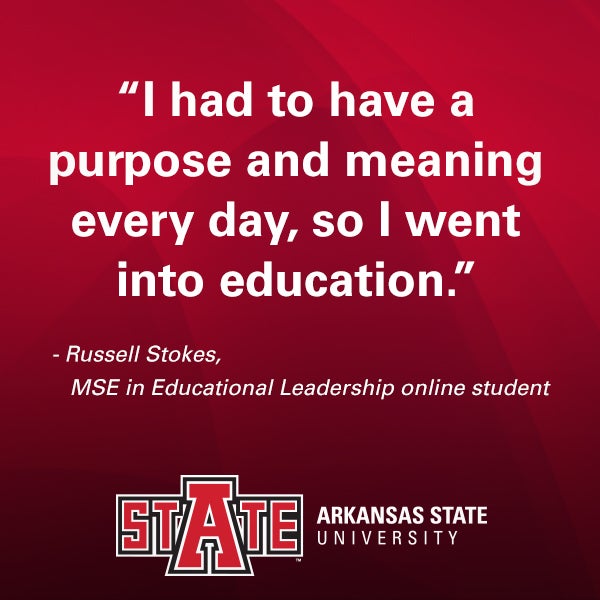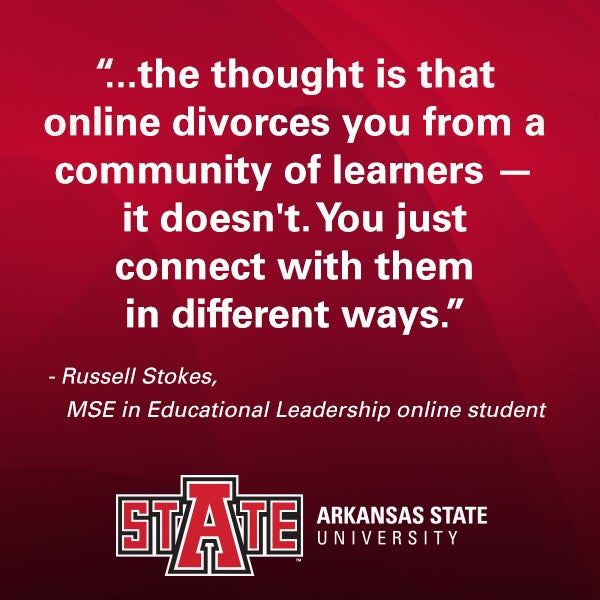Fresh out of Arkansas State University with a communications degree in 1997, Russell Stokes was ready to take on the world.
Then, he decided he would rather change the world.
“When I got out of college, I worked for the Radio Shack Corporation,” Stokes said. “I worked in their advertising department, and I had done freelance graphic design before. But I knew it wasn’t the thing I wanted to do with the rest of my life. I had to have a purpose and meaning every day, so I went into education.”
Stokes is in his second year as Advanced Placement Coordinator and Instructional Specialist for the Curriculum Department at Jonesboro Public Schools after graduating with a Master of Science in Education in Educational Leadership online from A-State in 2014. In this role, Stokes is able to help students in some of the same areas where he had difficulty in school.
“I thought about my own life,” Stokes said. “And when I had my own personal struggles, I really could have used and valued someone to help me make sense of things — and that was in high school.”
Settling Into Teaching
Stokes moved back home to Arkansas from Texas with his wife and kids to start his career as an educator in 2001. It didn’t take long for him to figure out he was going to need some help adjusting to teaching.
“They tell you that in education courses, or they used to anyway, to sort of be a certain way,” Stokes said. “I guess basically, ‘A lot of teachers fit a certain mold, so be this way.’ I learned very quickly you have to be very human and very genuine with your students. You can’t be something that you’re not. So, they wanted me to wear a tie, and I don’t wear ties. My students saw through me pretty quickly.”
But once he started to heed the advice of his fellow educators, Stokes found his groove.
“It wasn’t until the second semester … that I started to feel really comfortable in teaching,” he said. “I probably wouldn’t have made it that first year if I hadn’t had really good mentors. The people I worked with were really the reason I had any degree of success. I’ve found that has continued throughout my career.”
Stokes said that three teachers — Jan Jackson, Teresa Parker and Kimi Muldner — helped him become a well-rounded educator.
“I had a collective, but I had those three ladies in particular,” he said. “One was kind of an emotional support — well, they all were. One was sort of intellectual support. And one helped me develop relationships.”
Stokes also found out early on how important relationships are in education.
“For me, education is all about relationships,” he said. “To be able to effect change at the relationship level… I’m very idealistic about people. I assume the best about people before I would the worst. My thoughts about education have always been defined by what makes a person learn. This has been true working with adults as well as students. What is it that they need to make their lives better? And how can I help them get there?”
Moving Ahead
Stokes, who grew up in Mountain Home, Arkansas, enjoyed teaching but looked for opportunities to grow new skills and connect with peers as well as students. In fact, he even looked into A-State’s online degree programs way back then, about a year before the university began offering educational leadership.
In 2011, Stokes took the initiative to complete the National Board Certification on his own.
“It was highly rewarding, and it made me a better teacher,” he said. “It also fostered a sense of leadership, as well. That set into my want to continue to learn that aspect of leadership within the school.
“I got my funding subsidized, so I paid half of the fee it would normally cost, and I even got some of that back. Again, I’m highly motivated. When I did it, I wanted to get it done in a year. I felt confident in my ability to put it together on my own.”
That led Stokes to finally decide to earn his Master of Science in Education in Educational Leadership online from his alma mater.
“Both my mother and my wife had seen me go through the national board process, which was a pretty tough process,” Stokes said. “So, when I decided to go back to school, they were very supportive. I had several friends in my same learning community who were going back to school the same way. I think the thought is that online sort of divorces you from a community of learners — it doesn’t. You just connect with them in different ways.”
Online Option Perfect
In addition to being able to still teach while he earned his degree, Stokes went the online route, so he wouldn’t have to take time away from his family, including his wife, Kristie, and his sons, Jackson and Wyatt.
“The oldest is 14 now, and the youngest is nine,” Stokes said. “At the time, it was four years ago when I started, I still had very young children. The convenience of attending to it on my time was big.”
Stokes said he had two courses in particular that he enjoyed most — Ethical Leadership [ELAD 6103] and Philosophies of Education [ELFN 6763].
“From the standpoint of just someone who is interested in what motivates different groups to want to do what is fair, I really enjoyed Ethical Leadership, and the different philosophies that really drive different philosophical mindsets in Philosophies of Education,” Stokes said. “When someone says, ‘I believe school is this,’ they’re coming from a particular philosophy of education. It was really good. Dr. Joe Nichols, who I’ve never met in person, put together a really thoughtful curriculum.”
Stokes said the knowledge that came from earning his master’s degree in educational leadership was immediately applicable to his teaching career. He had already taken a role as a lead teacher in the Academies at Jonesboro High’s Business, Communication Arts, and Law Academy.
“I think there’s sort of a feeling that, ‘I’m going to go get this degree, and then I’m going to go get a job,’” he said. “I would say that, for most people, an online degree is a great marriage for the kind of stuff that you’re already doing in your work.”
He also added that the degree was key to him moving forward in his career.
“It connects you to the next step,” he said. “I would not have been able to get to the next step had I not already been taking on some leadership roles in the context of both.”
Rewarding Work
Although Stokes does not work as closely with students on a day-to-day basis as he had most of his career, his job now includes working closely with new teachers.
“My superintendent is really forward thinking,” he said. “I work for very smart people. They looked at this problem of recruitment and retention and said, ‘We really need someone to work with novice teachers and teachers new to the district so we don’t lose them.’
“So, much of the work I do is basically to figure out what they need and to connect them with the right mentor. In my role, I spend a lot of time with them in their classrooms, talking with them about what’s working for them, what’s not working for them and what kind of support they need to grow in their profession.”
Stokes knows he made the right decision to go into education and make a difference in the lives of students and teachers, but he still relies on one thing he learned while in working in advertising.
“Communication is key,” he said. “Without communication, you can’t build relationships. Without relationships, education doesn’t work.”
Learn more about the A-State online MSE in Educational Leadership program.


